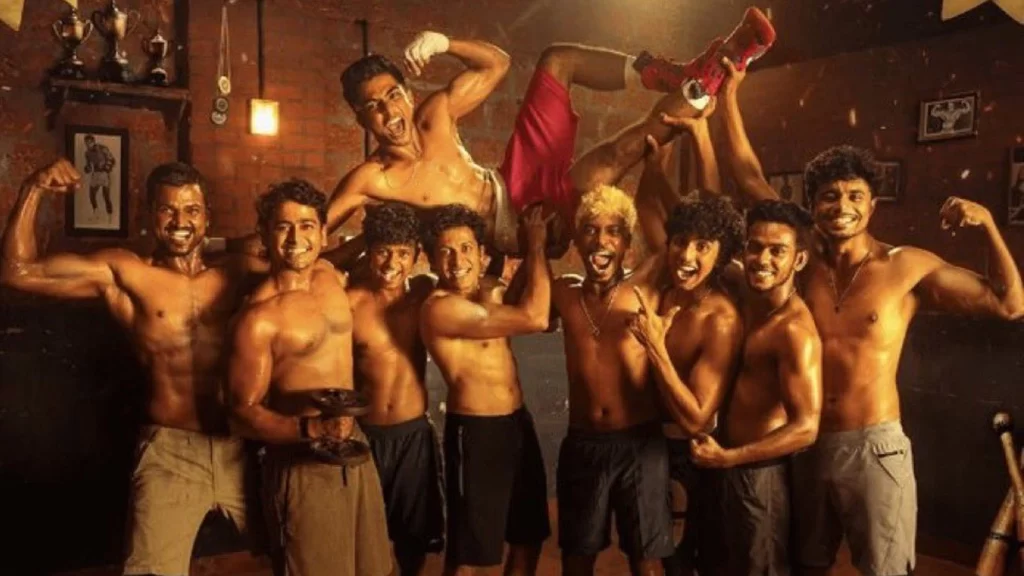The film is fun and fabulously made, but this is a screenplay that gels better as an idea, when you think about it, rather than something that really excites you on screen. The rest of this review may contain spoilers.
The most interesting aspect about Khalid Rahman’s new film is that it’s a boxing drama that’s not exactly a boxing drama. There’s no “I want to become a boxer” dream inside the protagonist Jojo, played by Naslen. He fails his Plus Two exams, and he just wants to get into a college through the sports quota. And when he does take up boxing, with his friends, there’s no “underdog has to win” angle, even though the main characters are all underdogs. There’s no secret manoeuvre taught by a coach at the last minute, and this coach is not the usual “tough older man with tender heart” cliché we get in boxing movies. This man has got his own anger-management issues, and he seems as much one of the boys, rather than a wise mentor. Alappuzha Gymkhana is a boxing drama where the boxing happens on the sidelines of life.
The opening scene sets the tone beautifully. Jojo and his friends are awaiting their Plus Two results. Whether they pass or fail, they decide they will have a drink – or more. The event is incidental. The reward is everything. And by “reward”, I don’t mean the booze, but the celebration of life as something with both highs and lows. In just a few films, Naslen has already established an archetype – and Jojo is a “Naslen type” of character. He brags at home, where his father is more interested in playing the piano than earning real money, and his frustrated mother daydreams while leaving the mixie on. She probably wants something more, but she knows that that’s not going to happen, so perhaps the only escape are these dreams. But outside his home, Jojo is a certified underachiever. He tries flirting with girls, but the results are iffy. He tries boxing, but the results are iffy. But somehow, he gets to be part of the Alappuzha team that will participate in the state-level amateur boxing championship.

The screenplay’s most beautiful decision is to not hinge the film on whether Jojo and his friends will win. In a rare rah-rah moment, Jojo mentions the famous Mohammad Ali quote: “floats like a butterfly, stings like a bee”. But the boxing tournament is like those Plus Two exams. Some will pass, some will fail. It’s all about being in the moment. It’s all about the experience. It’s not about whether Jojo’s romance will work out. It’s again about the experience, the things he does to impress the girl, and how she changes him, and how he no longer cares about being rejected, and how confidently he is able to treat the subject of women that he was so hesitant about earlier. It took me a while to realise it, but Alappuzha Gymkhana is also about Jojo’s coming of age.
But there’s a reason the film remains at a “likeable” level and doesn’t rise above it. The boxing parts have a definite structure, with one Alappuzha candidate getting into the ring with an opponent, and then the next one doing so, and then the next one. But the overall screenplay is a bit shapeless. Khalid Rahman seems to be asking why a film needs to be about any one thing. Instead of a film about Jojo’s romance, or Jojo’s friendships, or Jojo’s college dreams, why can’t the film be about all these things? In fact, why does Jojo even have to be the person the film is about? Why can’t the film be about the little moments that linger alongside these big plot points and the bigger-name actors? But at least for me, that is a theory that came together better in my head, while I was thinking about the movie, than on screen, while I was watching it.
But aside, this is an enjoyable outing. The technical guys – cinematographer Jimshi Khalid, editor Nishadh Yusuf, composer Vishnu Vijay – don’t just shine in the spectacle scenes, the boxing moments, but also in the way the wonderful Anagha Maya Ravi looks up at Naslen with just the right amount of amusement, captured at just the right angle so we get to register the precise emotion in that precise instant. And even if there aren’t many laugh-out-loud moments, there’s always something that makes you smile or something that warms the heart. The bit about the lottery ticket, the early boxing-training scenes with the count of “one-two”, the way a boxer in a dark space is rescued without any kind of drama, the bit about the ambulance, the way the fighting spills outside the ring and into the roads, or even the look a hungry boxer gives a boiled egg as he wraps it in a parotta – the film keeps telling us that life is what happens on the margins of the page.


